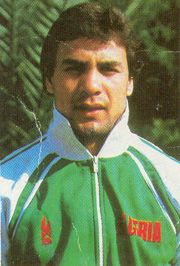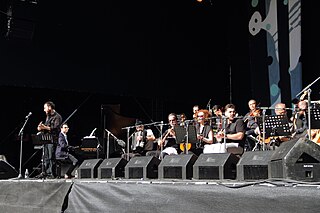Artists
Actors
- Hadj Abderrahmane, actor and comedian [1]
- Isabelle Adjani, French actress
- Allalou, playwright, theatre director, and actor known as the father of Algerian theater
- Mahieddine Bachtarzi, singer of opera (tenor), actor, writer, and director of the TNA (Théâtre National Algérien)
- Jean-Pierre Bacri, actor and screenwriter
- Ramzy Bedia, French-Algerian actor
- Leïla Bekhti, French-Algerian actress
- Alice Belaïdi, French-Algerian actress
- Catherine Belkhodja, French-Algerian actress
- M'hamed Benguettaf, actor and playwright
- Jean Benguigui, stage, screen, and television actor
- Dali Benssalah, actor in James Bond movie No Time to Die (2021)
- Biyouna, singer, actress and comedian
- Mohamed Bouchaïb, Libya-born Algerian actor
- Sofia Boutella, actress, model and dancer
- Rachida Brakni, French actress
- Patrick Bruel, singer, actor, and professional poker player
- Alain Chabat, actor and director
- Mohamed Chouikh, filmmaker
- Mohamed Fellag, actor and comedian
- Eva Green, actress and model
- Khaled Habib, singer-songwriter, composer, actor, film director
- Roger Hanin, film actor and director
- Marlène Jobert, actress, singer and author
- Reda Kateb, actor
- Sid Ali Kouiret, actor
- Rachid Ksentini, actor and comedian
- Karim Leklou, actor
- Maïwenn, actress, film director and producer
- Tahar Rahim, actor
- Rouiched, comedy actor
- Lyes Salem, actor and film director
- Samy Seghir, French-Algerian actor
- Hadj Smaine Mohamed Seghir, actor, director, and man of stage
- Smaïn, actor and humorist
- Patrick Timsit, comedian, writer, and film director
- Larbi Zekkal, actor and comedian
Directors and filmmakers
- Merzak Allouache, film director
- Abdelkader Alloula, theatre producer
- Jean-Luc Azoulay, television producer
- Yamina Benguigui, filmmaker
- Malek Bensmaïl, film director
- Mohammed Lakhdar-Hamina, film director, Palme d'Or at the 1975 Cannes Festival
- Ahmed Rachedi, film director–producer, pioneer of Algerian cinema
- Fatma Zohra Zamoum, film director
Fashion (designers, models)
- Loli Bahia, model
- Farida Khelfa, former model and actress
Illustrators
- Ali Dilem, editorial cartoonist
- Baya, painter
- Hocine Ziani, painter
- Le Hic, editorial cartoonist
- Rezki Zerarti, painter
New media
- Maurice Benayoun, artist and theorist
- Yves Saint Laurent (designer), clothing and fashion designer
Writers (including poets)

[[File:Moufdi_Zakaria_1964.jpg|thumb|180px|Moufdi Zakaria]
Contents
- Artists
- Actors
- Directors and filmmakers
- Fashion (designers, models)
- Illustrators
- New media
- Writers (including poets)
- Criminals
- Journalists
- Leaders and politicians
- Ancient Algeria
- Early Islamic Algeria
- Ottoman Algeria
- Algeria under French colonization
- Revolutionary War of Independence
- Independent Algeria
- Martyrs
- Military and intelligence services
- Musicians and singers
- Berber
- Classical
- Contemporary
- Jazz
- Musiques du monde
- Pop
- Rai
- Rap
- Rock
- Religious figures
- Scholars and academics
- Historians
- Linguistics
- Science
- Philosophy
- Sports
- Association football
- Athletics
- Basketball
- Boxing
- Fencing
- Ice hockey
- Judo
- Other sports
- See also
- References
- Ferhat Abbas (1899–1985), political leader and essayist
- Mohamed Aïchaoui (1921–1959), political leader and journalist
- Abdelkader Alloula (1939–1994), playwright
- Al-Akhdari (1512–1575), Arab-Algerian poet, Alim, astronomer, jurist and logician of Sherifian descent
- Malek Alloula (1937–2015), poet, writer, and critic
- Djamal Amrani (1935–2005), poet and essayist
- Jean Amrouche (1906–1962), 20th-century poet and writer
- Taos Amrouche (1913–1976), singer and writer
- Apuleius (c. 125–c. 180 C.E.), Latin prose writer
- Mohammed Arkoun (born 1928), scholar and thinker
- Leila Djabali (born 1933)
- Zighen Aym (born 1957), writer and engineer
- Farida Belghoul (born 1958), author
- Omar Belhouchet (born 1954), journalist
- Albert Camus (1913–1960), journalist, author, philosopher
- Mohammed Benchicou (born 1952), director and publisher of the Algerian newspaper Le Matin
- Salah Benlabed (born 1950), architect, academic, novelist and poet
- Latifa Ben Mansour (born 1950), writer, psychoanalyst, and linguist
- Malek Bennabi (1905–1973), writer and philosopher
- Rachid Boudjedra (born 1941), poet, novelist, playwright and critic
- Mohamed Cherak, journalist
- Hélène Cixous, feminist writer
- Mohammed Dib (1920–2003), 20th-century writer
- Tahar Djaout (1954–1993), poet, journalist, critic
- Assia Djebar (1936–2015), novelist, translator and filmmaker
- Mouloud Feraoun (1913–1962), writer and independence war hero
- Mohamed Hassaïne (1945–1994), journalist
- Miloud Hmida (born 1961), poet, critic, translator
- Yasmina Khadra (also known as Mohamed Moulessehoul) (born 1955), writer
- Aïssa Khelladi, journalist, novelist and playwright
- Ahmed Mahsas (1923–2013), political leader and writer
- Fodil Mezali (born 1959), journalist and writer
- Hocine Mezali (born 1938), journalist and writer
- Rachid Mimouni (1945–1995), writer, poet
- Ahlam Mostaghanemi, writer
- Sarah Rivens, writer
- Othmane Senadjki (1959–2010), journalist
- Kateb Yacine (1929–1989), 20th-century writer
- Moufdi Zakaria (1908–1977), lyricist of the Algerian national anthem "Kassaman"
- Ahmed Ben Triki (1650-1750), Algerian poet from Tlemcen











